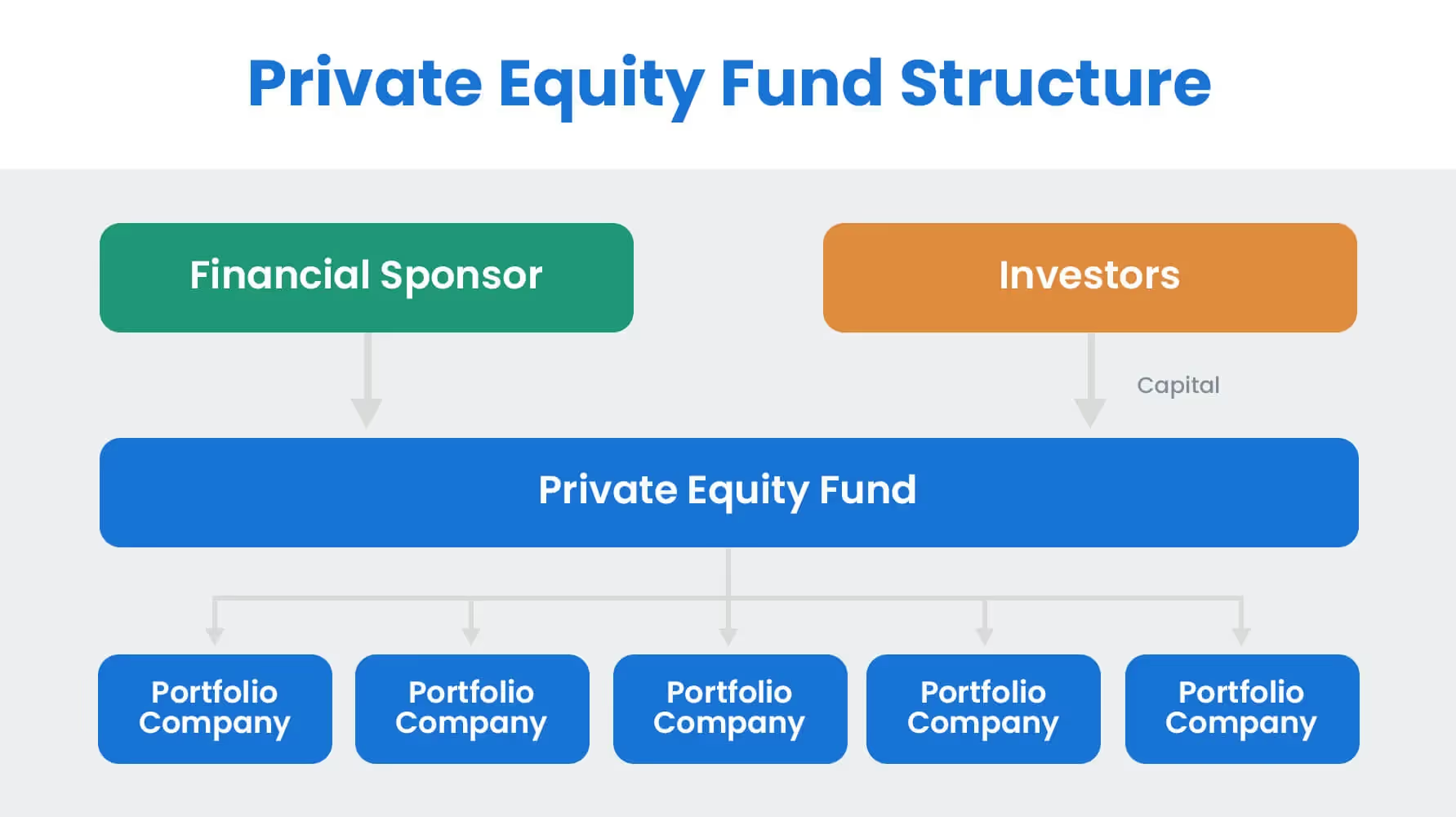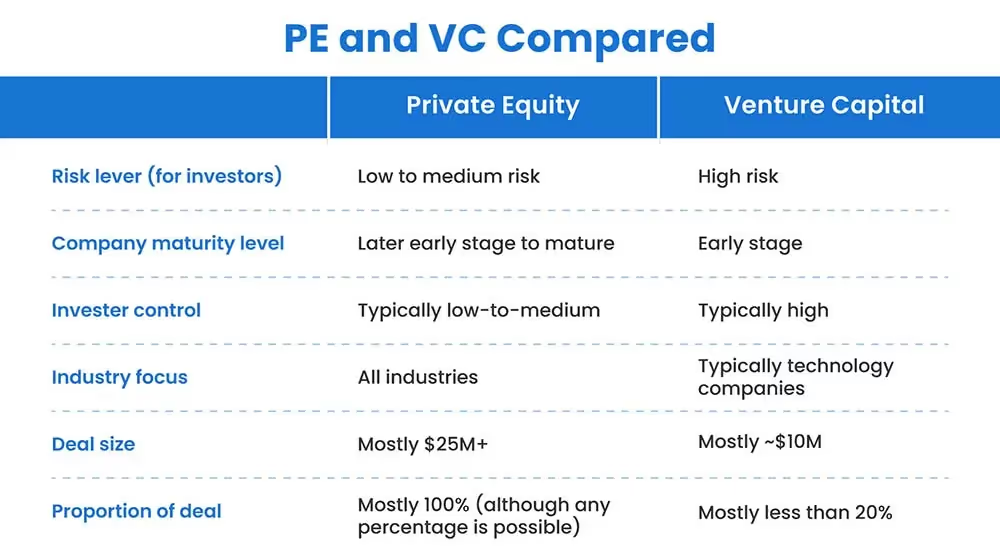For our 2026 list of the top private equity firms in the world, we researched the largest private equity firms based on Assets Under Management (AUM), and dug deeper to identify the top private equity firms in a number of major cities and states as well as outlining the types of assets each firm has under management (and how they became so big).
Obviously, PE plays a huge role in the M&A landscape, and we've written about topics like fund structure, private equity careers, the differences between private equity and venture capital as it relates to M&A (as well as a list of the top VC firms in the world), and more.
Let's take a look at the list of the biggest PE firms.
Here are the 15 largest private equity firms listed in order based on their current AUM (Assets Under Management):
1. BlackRock - AUM: $8.2 trillion

BlackRock is an unrivaled leader in global private equity, known for investment, advisory,and risk management services. Not adverse to risk or criticism, Blackrock has seen variability in its performance over the last 5 years. In 2022, BlackRock saw losses around 25% in assets under management (AUM) due to investor criticism of its impact investment strategy. That being said, BlackRock has demonstrated resilience and adaptability, reaching a new record of $641 billion in client cash in 2024 (Yahoo News), and entering into 2025 with $11.5 trillion in AUM (Reuters). This further reaffirms BlackRock's dominance in the industry of asset management and financial services.
Anticipate further developments from BlackRock in 2025,including potential revisions to its ESG strategy, as the company remains committed to addressing investor concerns and sustaining its position as a leading force in private equity and investment management. With a focus on alternative investments, growth equity, partnerships, and strategic mergers,BlackRock continues to attract institutional investors globally while actively supporting startups and technology companies. Its inception in London and expansion into business services have further solidified its net worth and standing in the financial sector.
2. Blackstone - AUM: $1.1 trillion

Blackstone is a leading PE Firm, notably winning Asset Manager of the Year for PE Firms with an AUM over $100B at the end of 2024. With $1 trillion AUM and 85 portfolio companies,Blackstone is a global player across diverse industries.
After a 2022 shift in strategy around HNWIs, diverting capital from real estate and credit funds,Blackstone has expanded its focus on private equity growth strategies,financial services and alternative investments and partnerships.
2024 proved to be a big year for Blackstone, showcasing their resilience and adaptability in navigating market shifts. Expect Blackstone to stay a dominant player in the PE space, addressing evolving market demands, and delivering value for clients in 2025.
3. Apollo Global Management - AUM: $600 billion

Apollo Global Management's latest strategy, centered around expanding credit offerings to capitalize on rising interest rates, geopolitical shifts, and increasing liquidity challenges, has bolstered its standing in the financial landscape.
Moving into 2025, Apollo Global Management maintains a robust AUM of $600 billion, reflecting its continued success and adaptability in navigating dynamic market conditions. Anticipate Apollo to remain proactive in seizing opportunities and leveraging its expertise in credit investments to drive growth and value for its clients.
4. KKR - AUM: $550 billion

KKR continued its upward trajectory in 2023, capitalizing on market dynamics and positioning itself as a prominent player in the private equity landscape. Benefiting from BlackRock's short-term decline, KKR saw significant growth, raising a substantial $126 billion in funds over a 12-month period.
This impressive fundraising effort propelled KKR's AUM to $550 billion, solidifying its position as a leading global private equity firm. With its strategic initiatives and strong investor confidence, KKR remains on track to further ascend in the ranks of the industry.
As KKR continues to seize opportunities and maintain its momentum, expect the firm to reinforce its standing among the top players in private equity, driving value for investors and stakeholders alike.
5. The Carlyle Group - AUM: $420 billion

In a noteworthy shift, The Carlyle Group saw its private debt business surpass its private equity division for the first time in 35 years in 2022. This strategic evolution underscores the firm's adaptability and diversified investment approach.
Furthermore, The Carlyle Group made strides in sustainable investing by launching a clean energy developer, signaling its commitment to renewable energy initiatives. While specific investment figures were not disclosed, this venture aligns with the firm's forward-looking strategy and commitment to environmental responsibility.
As The Carlyle Group enters 2025 with an AUM of $420 billion, it continues to navigate evolving market trends and pursue innovative opportunities. Expect the firm to remain at the forefront of the industry, leveraging its diverse portfolio and strategic initiatives to drive growth and create value for stakeholders.
6. CVC Capital Partners - AUM: $180 billion

As the largest European private equity company by AUM, CVC Capital Partners remains a key player in the industry. In 2022, the firm had considered listing on the Paris Stock Exchange, but ultimately decided against it, citing a lack of immediate plans for such a move.
As interest rates in Europe continued to rise, CVC Capital Partners remained cautious about potential listing plans in the first half of 2023. However, as market conditions evolve, the firm's decision-making process may be subject to further assessment.
With an AUM of $180 billion, CVC Capital Partners continues to leverage its expertise and strategic positioning in the European market. Expect the firm to navigate market dynamics thoughtfully, prioritizing sustainable growth and value creation for its investors and partners.
7. TPG - AUM: $160 billion

In contrast to CVC Capital Partners, TPG proceeded with its IPO in 2022, opting for a listing on the Nasdaq index. This decision stood out given that most competitors had chosen the NYSE nearly a decade prior.
The $10 billion IPO was deemed successful, signaling investor confidence in TPG's prospects. However, the true measure of success lies in how the market responds to the firm's recently announced focus on debt and infrastructure.
With an AUM of $160 billion, TPG continues to navigate shifting market dynamics with agility and foresight. Expect the firm to uphold its commitment to innovation and value creation as it explores new avenues for growth and investment.
8. Thoma Bravo - AUM: $130 billion

Specializing in technology investments, Thoma Bravo remains vigilant for potential opportunities amid evolving market conditions. With gathering clouds over the tech industry, the firm sees potential to acquire underpriced assets in 2023.
In a notable move in 2022, Thoma Bravo attempted to outbid Elon Musk's bid for Twitter, a decision that may have repercussions for both parties. As the year drew to a close, the firm announced a substantial $32.4 billion fund earmarked for new acquisitions in the technology sector.
With an AUM of $130 billion, Thoma Bravo continues to demonstrate its strategic foresight and agility in pursuing value-driven investments. Expect the firm to remain proactive in identifying and capitalizing on opportunities for growth and expansion.
9. EQT - AUM: $120 billion
_logo.svg)
EQT continues its rapid ascent as one of the most prominent private equity firms globally in the year 2025. With an AUM of $120 billion, the firm maintains its momentum following a remarkable fundraising year in 2022.
Based in Sweden, EQT raised $57 billion, solidifying its position as a top fundraiser globally. Notably, the firm's focus on Japanese technology deals underscores its strategic approach to expanding its portfolio and seizing growth opportunities. As EQT remains on the radar of industry watchers, expect continued innovation and value creation from this dynamic player in the private equity landscape.
10. Insight Partners - AUM: $110 billion

Despite market dynamics, New York-based Insight Partners maintains a unique stance, advising investors to steer clear of debt in 2023. This strategic move reflects the firm's commitment to navigating crowded fields and focusing on its Europe-focused private equity strategy.
As Europe grapples with economic challenges, Insight Partners remains steadfast in its approach, prioritizing stability and value creation for its LPs. With an AUM of $110 billion, the firm continues to uphold its track record of success and resilience in the ever-evolving private equity landscape.
11. Warburg Pincus - AUM: $100 billion

With an impressive AUM of $100 billion, Warburg Pincus continues to be a formidable force in the private equity arena. Renowned for its focus on growth investments and strategic partnerships, the firm has established itself as a trusted partner for companies seeking to scale and expand their operations.
By leveraging its extensive industry expertise and global network, Warburg Pincus actively identifies and pursues investment opportunities across a diverse range of sectors, from technology and healthcare to consumer and industrial. With a commitment to driving value creation and fostering long-term success, Warburg Pincus remains at the forefront of the private equity landscape, poised to capitalize on emerging trends and opportunities in the ever-evolving market.
12. Advent International - AUM: $95 billion

Advent International stands out as a leading private equity firm with an AUM of $95 billion. Specializing in buyouts and growth investments, the firm has a proven track record of partnering with management teams to unlock value and drive sustainable growth.
With a global presence and deep sector expertise, Advent International actively seeks out investment opportunities in industries undergoing transformation, such as technology, healthcare, and financial services. By employing a collaborative and disciplined approach to investing, Advent International continues to deliver superior returns for its investors while making a positive impact on the companies it supports and the communities in which they operate.
13. Bain Capital - AUM: $90 billion

Bain Capital remains a cornerstone of the private equity industry, boasting an AUM of $90 billion. Known for its diversified investment approach and strategic acquisitions, the firm has a rich history of successfully partnering with companies to accelerate growth and enhance operational performance. Leveraging its extensive global network and deep industry knowledge, Bain Capital identifies investment opportunities across a wide range of sectors, including consumer, retail, healthcare, and technology.
With a focus on generating long-term value and fostering innovation, Bain Capital continues to be a trusted partner for companies seeking strategic guidance and support in navigating today's dynamic business landscape.
14. Vista Equity Partners - AUM: $85 billion

Vista Equity Partners stands at the forefront of the private equity sector with an AUM of $85 billion. Specializing in software and technology investments, the firm has established itself as a leader in driving value creation and innovation within the tech industry. With a proven track record of success, Vista Equity Partners actively partners with high-growth software companies to accelerate their growth trajectories and maximize their potential.
By providing strategic guidance, operational support, and access to a global network of resources, Vista Equity Partners empowers its portfolio companies to thrive in today's competitive market landscape.
15. Silver Lake Partners - AUM: $80 billion
_logo.svg.avif)
Silver Lake Partners remains a prominent player in the private equity landscape, boasting an AUM of $80 billion. Focused on technology investments and strategic partnerships, the firm has earned a reputation for its ability to identify and capitalize on transformative opportunities within the tech sector. With a keen eye for innovation and a deep understanding of market dynamics, Silver Lake Partners actively seeks out investment opportunities that offer significant growth potential and value creation.
By leveraging its extensive industry expertise and network of strategic relationships, Silver Lake Partners continues to drive success and deliver exceptional returns for its investors and portfolio companies alike.
Top PE Firms by Geography
The right PE firm for you or your business is dependent on many variables, with location being a key consideration. Finding a PE firm in your region can be helpful because they understand the challenges and complexities of the local market. Below, you will find the top private equity firms based on geography in major cities across the U.S.
Top Private Equity Firms in Boston
Boston is known as a powerhouse for innovation and private equity, with Massachusetts ranking as one of the top states for private equity penetration. With a focus on technology, healthcare, and education sectors, Boston benefits from its many world-renowned universities like MIT and Harvard. In 2022, Massachusetts received over $77 billion in private equity investments across 462 deals, showcasing its strong ecosystem for growth-stage businesses.
- Candescent Partners
- Gemini Investors
- Artemis Capital Partners
- Pleasant Bay Capital Partners
- Sagepeak Capital
- Union Park Capital
Top Private Equity Firms in Chicago
Chicago has become a hub for private equity with its central midwestern location and diverse economy. Illinois consistently ranks among the top five states for private equity investment, with sectors like manufacturing, logistics, and industrials being key focus areas. In recent years, Chicago PE firms have invested over $100 billion annually, driving regional economic growth and job creation.
- Pfingsten Partners
- Crescendo Capital Partners
- Right Lane Capital LLC
- Next Gen Growth Partners
- CIVC Partners
- Industrial Opportunity Partners
Top Private Equity Firms in Washington D.C.
Washington D.C. stands out from other PE hubs for its focus on government services, defense, and infrastructure investments. Private equity firms in the D.C. area benefit from proximity to federal agencies and policymakers, giving them a unique advantage in navigating regulatory complexities. The greater D.C. area has seen steady private equity activity,with billions invested in companies that support federal contracts and national infrastructure projects.
Top Private Equity Firms in Dallas
Dallas has become a private equity hotspot, particularly in sectors like energy, technology, and healthcare. Consistently ranking as one of the top three states for private equity investment, Texas receives over $90billion annually. Dallas benefits from a business-friendly environment, low taxes, and its position as a transportation and logistics hub.
- Baymark Partners
- Gauge Capital
- Hillstar Capital
- LongWater Opportunities
- Pharos Capital
- Clavis Capital Partners
Top Private Equity Firms in New York
New York City remains the financial capital of the world,attracting private equity firms with its unmatched access to capital markets and talent. New York state received over $175 billion in private equity investments in 2022, far more than any other state. Firms in the city often lead deals across industries, including financial services, real estate, and technology, making it a global leader in private equity activity.
- Fidelman & Company
- Hellman & Friedman
- AEA Investors LP
- The Riverside Company
- Prime Group Holdings, LLC
- Vimtra Ventures
- JLL Partners
- Kuzari Group LLC
Top Private Equity Firms in Florida
Florida is experiencing rapid economic growth fueled by private equity investments in healthcare, real estate, and manufacturing. In2022, Florida attracted over $60 billion in private equity investments, ranking it among the top states for growth-stage capital. Cities like Miami, Tampa, and Orlando are emerging as key locations in the Southeast for private equity deal flow.
- Hidden Harbor Capital Partners
- KLH Capital Partners, LP
- Mangrove Equity Partners
- The Anderson Group, LLC
- Slack Water Capital
- MBF Healthcare Partners
Top Private Equity Firms in Atlanta
Atlanta is a critical hub for private equity in the Southeast, supported by Georgia's robust economy and low business costs.Private equity firms in Atlanta typically specialize in technology, real estate, and financial services. Georgia received over $40 billion in private equity investments in recent years, helping fuel job growth and business expansion across the state.
- Source Capital
- Arcapita Group
- Fulcrum Equity Partners
- Third Century Management LLC
- Cairngorm Capital Partners LLP
- Vion Investments
- Brighton Partners, LLC
Top Private Equity Firms in Charlotte
Charlotte, North Carolina, is a rising star in the private equity landscape, with a strong emphasis on financial services and manufacturing. As one of the nation’s fastest-growing cities, with over $25billion in annual private equity investments, Charlotte has become a prominent banking hub, creating synergies between private equity and financial institutions.
- Harren Equity Partners
- Plexus Capital
- Capitala Financial Advisors LLC
- Zabel Companies, LLC
- Venture Capital Advisors
How does Private Equity Work?

The Process
The process for private equity funds typically works along the following lines:
1. The Capital Raise: The period in which the private equity team seeks to convince investors to invest their capital in their fund or (sometimes) their company.
2. Deal Sourcing: The period in which the private equity company looks for suitable opportunities that fit its investment thesis.
3. Post-acquisition Operational Improvement: The period in which the acquired company is restructured by the private equity team to generate more value.
4. Liquidation: The period in which the acquired company is either sold or brought to an IPO enables the private equity company and its investors to liquidate their investments. The end goal of this process is to generate a higher multiple of earnings (i.e. value addition) than the company or asset was acquired for.
Characteristics of Firms that Private Equity Invests In
If there is a single theme that unifies all private equity investments, it is that the companies or assets being invested in are undervalued in some way.
Either because their current owners have not spotted the potential of the business, have mismanaged it, or have not been able to access the capital to bring the company to scale, the private equity company seeks to add value that will ultimately generate investor returns. Beyond this, private equity companies also pay attention to issues such as:
- Industry and market dynamics
- Cash generation potential of business
- Competitive positioning
- Technology/capital requirements (insert the link on capital investments)
- Potential to disrupt an industry
What are the most common PE strategies?
A previous DealRoom article discussed the six most common strategies used in private equity. These are:
- Venture capital
- Growth capital
- Real estate
- Mezzanine financing
- Leveraged buyout (LBO)
- Fund of Funds (FoF)
What is the largest private equity firm?
Blackstone is the largest private equity Firm, with KRR trailing shortly behind. With $1 trillion in AUM, Blackstone invests in growth-oriented businesses globally.
Is Blackstone bigger than BlackRock?
No, as of January 2025, BlackRock had $11.5 trillion in assets under management, while Blackstone only has $1 trillion. Both are leading private equity firms and arguably the two most dominant players in the space.
Now this comparison isn’t truly fair as BlackRock is a publicly traded company, not just a PE Firm. Of its assets, only $49.1 billion is dedicated to private equity, the rest of its AUM is allocated to exchange-traded funds (EFTs,) fixed income, or multi-asset solutions.Blackstone’s services are more focused on investments such as private equity,real estate, and credit.
Who is the richest person in private equity?
Stephen Schwarzman, CEO and Co-Founder of Blackstone, is often considered the richest person in private equity with a net worth of $37.4billion. Additionally, Schwarzman owns 232 million shares of Blackstone, making him the largest shareholder and one of the most powerful people on Wall Street.
How does Private Equity Differ from Venture Capital?
For details on this question, check our deep dive into the differences between private equity and venture capital (or check the list of top venture capital firms). Notwithstanding, the main differences can be summarized as follows:

Looking at private equity companies and the investment strategies they outline for markets as a year begins is often a good way of telling which way the wind will be blowing.
DealRoom M&A Platform has been a catalyst in many large deals for private equity companies over the years and has been privileged to gain some valuable insights into private equity thinking in the process. Talk to us today about how we can drive your next private equity engagement.



.avif)















.avif)
.avif)
.avif)



.avif)
.avif)
.avif)




.png)
.png)
.png)
.svg)

.svg)
.avif)
